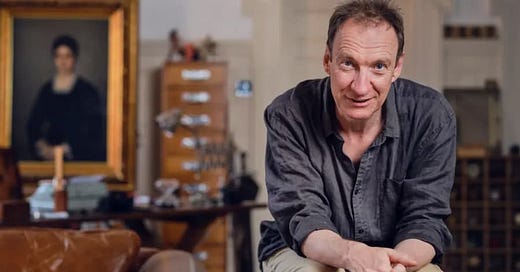“I have ideas and I’m itching to write already.”
Actor David Thewlis is known for his dynamic characters in many films including Naked, as Remus Lupin, a “Professor of Defense Against the Dark Arts” in the Harry Potter series, and many more.
He has perspectives on writing fiction that may be of interest.
His first novel “The Late Hector Kipling” was the focus of an interview by screenwriter William Monahan:
William Monahan: “I find that when you’re writing a character, you are that character. It’s probably no joke that Shakespeare was an actor. Dickens, famously, was a brilliant performer of his invented people, not only when he was reading in public but also when he was creating them on the page.
“Do you see any connection yourself between the ability to act and the ability to write?”
David Thewlis: “I think there is a very strong connection. One of the most pointless questions I seem to get asked over and over is, ‘Do you think you may now give up acting?’ as though I am condemned to choose one or the other.”
Character development on screen and page
He notes, “As an actor you spend your life creating characters, understanding motives, paying great attention to the details, the mannerisms, the speech inflections.
“It does not seem much of a jump then to shift this ability to the page. I work with dialogue all the time and endlessly persevere to make speech sound natural.
He points out that “Actors read a lot—scripts, source novels, research; they live with words, so it seems a natural progression to try and write a few yourself, since over the years you have learned what works.
“Also, in my own case, I was actually writing a long time before I even thought of acting. It has just taken me rather a long time to find my own style and also to build up the confidence to put something out there.”
A shockingly funny book
William Monahan calls Thewlis’ novel The Late Hector Kipling “a hyper-literate, shockingly funny, and just plain shocking look at vanity, revenge, sex, suicide, death, madness, and murder in the London art world.”
Thewlis describes some of the themes that can relate to other artists:
“There are parallels to the film world here, of course. The money is similar at that level of success, the bitterness, the rivalry, the celebrity, and, of course, the twisted fans.
“The money and the fame can drive wedges into relationships, with the ones who get left behind wondering if their rival is merely lucky or if it is in some way a reflection of their own lack of talent.
“Many friendships cannot bear the weight of this ambiguity, and they begin to suffer a loss of spontaneity and generosity of spirit.”
He also also found the art world to be “full of amorality. The players are fantastically eccentric. They seem to crawl around in some shady hinterland between home decorating and pornography, and one always imagines that they must smell a bit funny.”
(From 2007 BlackBook magazine article “Fiction (With a Twist of Lennon)”.)
Writing in angst
Another interview article (UK Vogue, Sept 2007), described his writing process.
Thewlis said, “I rented a flat in Soho and cut the plug off the television.”
“By day, he walked the streets and sat in cafes, watching and plotting. By night, he wrote. Within nine months, he had written his first draft.
“His publishers loved it, but said it needed some work. By then, Thewlis was in love with Friel and his life in general.”
“I used to write out of angst,” he explains. “When I met Anna, I lost that urge to vent spleen.”
[His partner at the time, actor Anna Friel, starred in the witty and fun TV series “Pushing Daisies” among other projects.]
Thewlis' newer novel is Shooting Martha, 2021.
In his Guardian interview, Michael Hogan asks Thewlis:
Your new novel is about a celebrated film director mourning his dead wife. Where did that premise come from?
Originally it was a screenplay idea. But when I was making a film called Guest of Honour with [Armenian-Canadian auteur] Atom Egoyan, we formed a lovely friendship.
He read my treatment, we went out for dinner and he said “You know what? It’s a terrific idea but I think it’s a novel.”
I went home that night and started writing in my notebook straight away.
Turning it into a novel freed me up to invent a broader world than a low-budget film.
It also became much more humorous than I’d envisioned this serious Hitchcockian film to be. I’m naturally drawn to things with a darkly funny vein running through them. Life is at once tragic and comic, so I find black comedy is honest and real.
Your first novel, The Late Hector Kipling, was published in 2007. Why the long gap?
I wrote most of it even longer ago, in 2000. My life was more chaotic then. I was on my own a lot, working until 3am, fuelled by cigarettes and wine.
I thought that was the writing life. Bill Nighy and Diana Quick kindly loaned me this cottage in Norfolk and I’d go down the local pub and drink whisky because it was a Hemingway thing to do.
Except I’d get terrible hangovers, not write a word and stare at a blank page in this remote house, like The Shining.
This was written in almost the opposite way: sober, no smoking, not on my own. Indeed, I’d read aloud what I’d written to my wife each evening and we’d discuss it. She deserves lots of credit.
There won’t be such a long gap before the next one. I have ideas and I’m itching to write already.
Quotes and photo from interview article David Thewlis: ‘It does get to you, spending more waking hours as a character than oneself’ by Michael Hogan, the Guardian 25 Jul 2021.
~~~~~~




